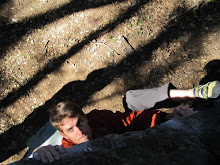Corruption
In regards to the huge debate in the US now considering illegal Mexican immigrants, I've always felt that an ideal solution to all the border control problems would be to remove the borders completely. I've figured that the border results in the US taking advantage of poverty in Mexico. Wouldn't the world be wonderful if there were no borders creating such disparities?
Lately I've been realizing, however, how unrealistic such a solution might be. Corruption in government - in all countries - naturally prevents any such Utopia. I've been considering how corruption in government perhaps creates a need for borders.
San Jose is well known for it's high crime rates. I've been told that Costa Rica has the same amount of police as they did fifty years ago. A solution to the crime in the city seems obvious.
When I asked a San Jose native the other day why he figured there was such crime in the city he explained that the cops here simply aren't paid enough. At least a large majority of them are corrupt. He said, "There are people that could be good cops, but they all have jobs elsewhere!" He elaborated, "So the people that end up being cops are the people that don't have anything else to do." Perhaps that is a bit cynical, but it definitely shows an interesting aspect of the politics down here.
On the bus to Nicaragua I had some further insight. About 3 km from the border the bus stopped and let off a bunch of people who ended up walking down some dirt trail away from the road. I asked the guy beside me where he though they were going and he said, "They're going to Nicaragua... they just have to hike a ways to get around border control." The bus had already been stopped and checked by border control, and so I asked how they had gotten by them! He replied simply, "Oh, they just paid the cops a bit so there wouldn't be any problems."
On the way back from Nicaragua I saw another funny incident. After I had gone through all the hoops at the border and gotten on the bus headed toward the city, I was surprised when the bus stopped at the same trail. All of a sudden about 20 or 30 Nicaraguans came out of a shack and boarded the bus. One of them ended up sitting by me, and I had a chance to talk to him a bit. I asked him how people are so easily able to cross the border illegally and he told me that they just needed to contact someone with the police to set everything up so that they don't have any troubles with the border control farther down the road - for a small fee, of course.
Now, I suppose it is easy to complain about the unfamiliar differences in government here (and I'm not saying that there is no corruption in my government - it's just different there), but it is difficult to see any solutions. I suppose that's the same way everyone around here feels. They do live well, for the most part, anyways.
So that's a bit of insight into how things are down here. It's still paradise, just with its fair share of the real world.


3 Comments:
To be honest with you Sam, you are learning day by day. When you are fed up with all the corruption, catch a couple of weird diseases here and there, and suffer from the crappy medical care, you will appreciate the United States more and more... Wait and see, the days will show you!
I discovered this briefly during my stay in Peru. I skimmed the surface on the problem involved in obtaining an education with all the corruption that exists within the government.
In state run schools, or public universities, students often run into problems such as universities shutting down. I experienced one such instance in Trujillo during the summer of 2004, when the university shut down due to the fact that the president of the university was under suspicion of embezzlement. The students lost all of their tuition and hard hours of study which was made doubly worse given the fact that final exams were the following week. You can read my ethnography at the usu webpage under the anthropology field school section, if interested.
By the time you begin to understand the problem, and the depth involved, situations seem to change slightly and it seems impossible that a solution can be reached. Or perhaps it is that there are such a myriad of solutions, the "most correct" is hard to determine.
Keep on talking to the locals. I love what you're doing. I love it so much, I might come down and join you. Would that be ok?
Yeah, Julie! Come on down! Costa Rica is a great place with great people to get to know! Plus people from tons of other countries to get to know, too.
In regards to Aladin's comment... I know what you mean. After a few days here I began to realize a lot of things I had taken for granted in the US. However, at the same time I like to try and adapt to the different culture so I can better understand it in the end.
Costa Rica really is a great place! Some of the differences are sometimes a bit hard to get used to, but the awesome climate makes up for it! :)
Post a Comment
<< Home